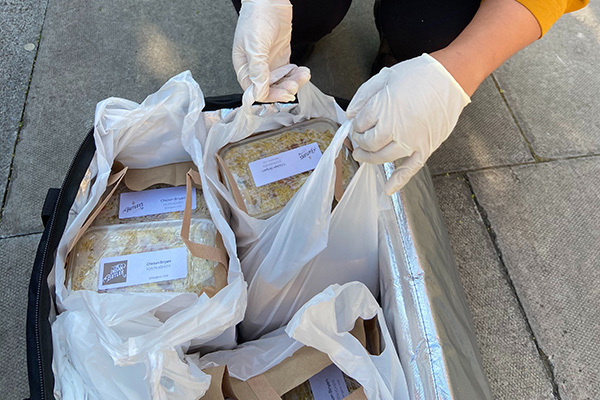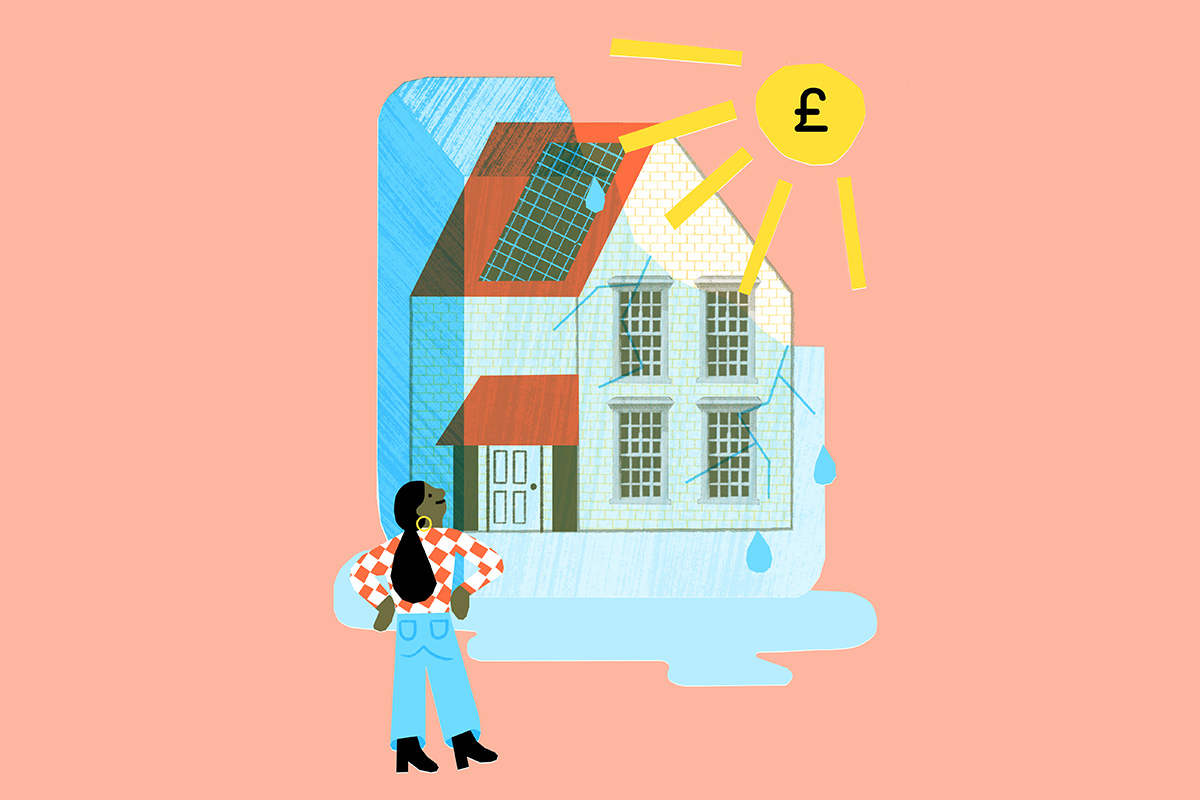You are viewing 1 of your 1 free articles

Aileen Evans is chief executive of Grand Union Housing Group
We must dispel myths about poverty in order to build a fairer system
My Twitter thread about the experiences of three women in poverty went viral. It taps into a crucial debate about welfare and is one we must win if we want to rebuild from the pandemic in the right way, writes Aileen Evans
The Twitter thread started because I was angry.
There was a post on a local school Facebook group about the free school meal voucher debacle, trying to find out if it was happening locally; if people were being offered the miserly and insulting food parcels that have been the subject of campaigns by Jack Monroe and Marcus Rashford. As ever, it was the comments under the post that got me going.
One of my predecessors as Chartered Institute of Housing president, Alison Inman, told me to never read the comments. Good as that advice was, I’m glad I didn’t take it this time. The ‘debate’ about vouchers v food parcels was offensive, upsetting and completely one sided:
“At least they get something.”
“In a lot of areas, the money was sadly not being spent on children’s lunch.”
“You can’t trust everyone to buy the right things.”
“It will go on cigarettes and scratch cards.”
“There will always be some who bang on about not being able to feed their kids properly, but they won’t go without their smokes and satellite TV.”
Naturally, I weighed in, and I’m pleased to say that many in the school Facebook community were supportive – although responses were still pretty evenly divided.
I was still shocked about the scale of ignorance and denial, so I took to Twitter. Some of you will know that I like to tweet a bit. Over the years my tweets about housing, mental health and the antics of children two and three have got me a fair number of followers, and I was hoping to help break down the stereotypes about poverty.
Well I was blown away by the response. Nothing I’ve ever posted has touched a chord with people in the way that this did. So, what exactly was it that stirred people’s feelings and stimulated this overwhelming support?
I told the stories of three strong and determined women. These weren’t women that had run marathons or trekked to the poles.
The furore over whether people in poverty can be trusted with vouchers reminds me that, over the years, I’ve come across many people, some in low waged jobs and some, for various reasons not working. A thread about poverty, taking responsibility and budgeting. 1/n
— Aileen Evans (@Bushbell)The furore over whether people in poverty can be trusted with vouchers reminds me that, over the years, I’ve come across many people, some in low waged jobs and some, for various reasons not working. A thread about poverty, taking responsibility and budgeting. 1/n
— Aileen Evans (@Bushbell) January 12, 2021
They were women whose courage and endurance were taken up with managing their way through poverty and making the daily choices that kept them and their families’ heads above water. I talked on Twitter about the impact on their families and the completely impeccable budgeting skills they deployed to feed themselves and keep a roof over their heads – and how the system was stacked against them.
I had met each of the women back at the time the bedroom tax was introduced. We knew things were going to get bad and we wanted to understand what Grand Union could do to help. As part of this, I tried out the Universal Credit system with a dummy claim.
It took me and a couple of colleagues 45 minutes to get through the pre-screening questionnaire. You get an hour of free internet at the library (or you did when it was open). Welfare reform looked like it was going to make the claims process harder and more complex, as well as snatching support away from people that were already making heroic efforts to cope.
On top of that, there appeared to be a concerted effort from parts of the media and government to insult and denigrate anyone that needed to claim benefits. Really, I shouldn’t have been surprised by that Facebook group. Seven years on and we can still see how effectively the Benefit Street message landed.
But here’s the thing. Increasingly, benefit claimants aren’t ‘other people’. I already knew this, because for a short period as a teenager I stood in the separate queue for free school meals. In my working life I knew that claims for out-of-work benefits are usually short term, and many Universal Credit claims are from low-paid workers with ‘flexible’ contacts (the latest report from the Joseph Rowntree Foundation (JRF) puts the figure for in-work poverty at 13% in 2018/19).
So recently I really started to hope that the tide was turning, particularly when I saw the reports from the 37th British Social Attitudes Survey last year. Based on 2019 survey data, it looked like the ‘strivers v skivers’ attitudes were softening, with the proportion of people that thought benefits were too low (36%) equalling those that thought they were too high for the first time since 2001. Surely it was becoming increasingly obvious that we may all need help from time to time?
At Grand Union, with more than 12,000 homes, we have 1,000 more Universal Credit claimants than we did at the start of the pandemic. According to the JRF, almost 4.6 million households were receiving Universal Credit in August 2020 – up 90% since the start of the year.
“We need a widespread recognition that everyone benefits from the safety net of a functioning welfare state”
Many of these families have never claimed any sort of benefit before; they’re struggling with the complexity of the system and daunted by the level of benefit they’re expected to manage on. Increasingly, people need help to get the help they need.
Is the pandemic teaching us to become a more caring society, with stronger social ties and mutual support?
Like everyone else in these strange times, I have good days and bad days. I’m buoyed up by the Social Attitudes Survey and stories of foodbank volunteers, amazing neighbours and carers, but then I hear about anti-mask protesters or hear stories about the ‘undeserving poor’, and I see us heading towards a Mad Max dystopia.
I find it hard to know which way we’re really going day to day, but I do know where we need to get to. We need a widespread recognition that everyone benefits from the safety net of a functioning welfare state, including a good supply of genuinely affordable social rented housing, free from stigma and humiliating tests of entitlement.
To get there we need to change public opinion – to dispel the myth that people on benefits are lazy or stupid or can’t be trusted to make sensible choices around how they spend money.
In any group of people – doctors, nurses, housing managers or delivery drivers – there will be some that make bad choices. As a society, we don’t usually punish their children for those choices, and we should be no different in our attitude to the children of people on benefits.
Children living in poverty have enough to cope with already. They don’t need us to add to their anxiety, have a go at their parents or drag down their sense of self-worth. Like any other child, they need to feel secure and well fed to build their confidence, support their learning and help them to thrive. I remember how I felt standing in the special queue for the free school meals, and I’m absolutely committed to being part of the solution for children in need.
When getting through the week is an achievement, we need to value that and learn from it. It’s so important that Marcus Rashford has shared the stories about how his mum managed her family through the difficult times.
We should spread the learning from people like Jack Monroe, the inspirational @BootstrapCook. It’s not just about breaking down the stereotypes and supporting those new to the benefit system.
I learned a lot about household budgeting from the people I met back in the early days of the bedroom tax. Those were some strong women succeeding against the odds. If their time and energy was freed up by the safety net of proper benefits, just imagine what they could achieve!
Aileen Evans, chief executive, Grand Union Housing; and president, Chartered Institute of Housing
Sign up for our tenancy management newsletter
Already have an account? Click here to manage your newsletters











